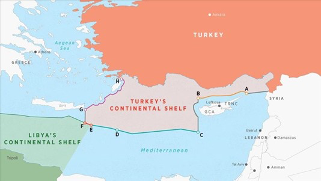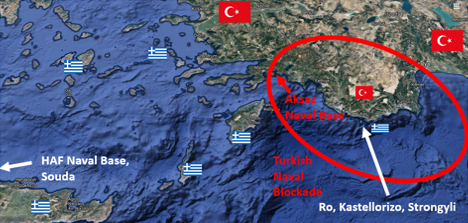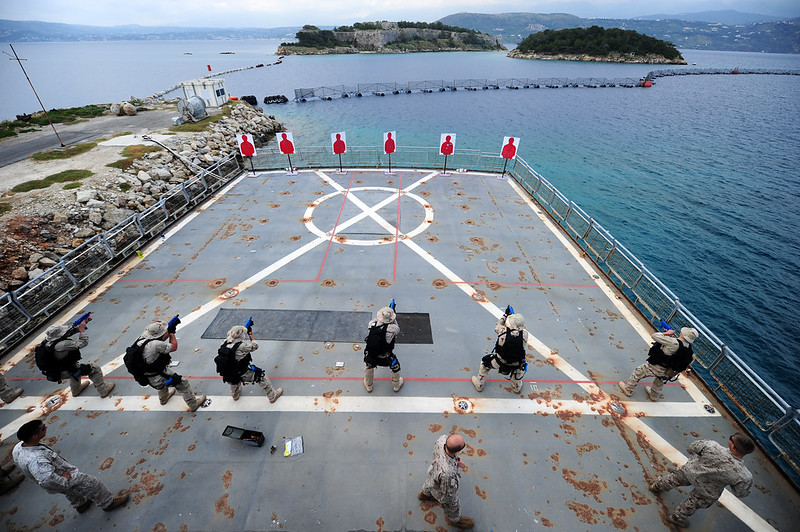“Greece can live inside the dream world of its past… Now it is time to sit at the table for the solution of chronic problems in the Aegean.” – Retired Admiral Cem Gürdeniz via Aydinlik
Recent statements by US Ambassador to Greece, Geoffrey Pyatt, support the notion that Greek islands have rights to an Exclusive Economic Zone (EEZ) and continental shelf. If Greece were to act upon these claims, Greece’s held small island of Kastellorzio cuts Turkey’s EEZ claims in half. But what if Turkey enforces its claimed maritime boundaries? How would Greece, neighboring states, and the US respond?
The Hellenic Armed Forces (HAF) face an increasingly complex operational environment. Athens sits in an increasingly hostile region replete with irredentist neighbors, such as Turkey, and growing interest from the great powers, particularly from China and Russia. Despite common NATO membership, relations between Turkey and Greece have ebbed and flowed throughout the past 40 years, recently, intensifying over Cyprus, Aegean Sea, and Eastern Mediterranean. The transatlantic security partnership is buckling, under the weight of political nativism and the competing national interests of its member states.
In this new geopolitical environment, the HAF are outmatched in terms of size, military capabilities, and technology, I posit a scenario wherein Turkey decides to act on its territorial claims on the Greek islands in the Mediterranean Sea. In such a scenario, Ankara displays both the willingness and capability to carry out while a thorough examination of some of the HAF’s operational shortcomings, finally, what Athens can do to close the widening security gap with its hostile neighbors.
Turkey-Greece relations are arguably at their worst since 1974. In May, Greek and international media reported movement of Turkish special armed forces upon Greek sovereign territory along the Evros river, spanning the area of about 10 football fields. This followed heightened levels of Turkish aerial incursions into Greek airspace, which in recent years have become a near-daily occurrence. According to the Greek Ministry of Defense, Turkey has violated Greek airspace “thousands of times.”
Under the leadership of President Recep Tayyip Erdoğan, Turkey is demonstrating an increased willingness to use military power in pursuing its policy objectives, Some key examples of this are Ankara’s invasion of northern Syria and deployment of Turkish military frigates to secure illegal oil drilling EEZ. President Erdoğan’s actions and rhetoric have provoked an immense backlash from many actors such as Egypt, Israel, and Greece who have been forced to ramp up elocutions as Turkey flexes its Mediterranean reach.
All these events have led to today’s crucial stakes, where the HAF finds itself in an entirely new defensive situation juxtaposed to a Turkish military that increasingly uses military power to further strategic goals in the Mediterranean. Turkey’s new agreement with the Tripoli Government (GNA) now places aggressive claims upon Greek islands, claiming maritime boundaries across the Eastern Mediterranean. These new boundaries have been condemned by the international community, despite the Tripoli Government’s recognition by the United Nations. President Erdoğan has also pushed Turkish armed forces to set up a base in Misrata, Libya, a front in the Libyan Civil War.

Greece has attempted to curtail Turkey’s rise in the Eastern Mediterranean through Operation IRINI and aggressive appeals to the EU and the United States, but these have been mainly unsuccessful. Greek Prime Minister Kyriakos Mitsotakis’ direct bilateral talks with President Erdoğan also have shown no progress. In July of 2020, Prime Minister Mitsotakis openly stated that Turkey’s new claims with the Tripoli Government are a “totally illegal memorandum of understanding” in international law.
Among the Turkish claims in the Eastern Mediterranean is the contentious and tiny island Kastellorizo and its smaller satellites, Ro and Stroggeli. These were granted to the Mussolini’s Italy through a series of agreements with Turkey and secured by Greece through the 1947 Treaty of Paris, a treaty that Turkey did not participate in, and thus, has never recognized Greece’s claims upon the island. The island is lightly defended by a small army base and an airstrip, and it has a population of fewer than 500 people. Still, its isolated location, far away from the major Greek islands, makes it a critical strategic location for Turkey to support its desired ambitions in the Mediterranean.
Over the past decade, Turkey has been increasing its amphibious war capabilities, continually improving its technologies to provide for sea-to-land invasions. One such example is the TCG-Anadolu, which can serve as a landing vehicle launched from nearby Aksaz Naval Base for Turkish Special Forces and marines, who have recently gained combat experience according to unclassified reports. Under the Mavi Vatan or “Blue Homeland” grand strategy, Turkey’s increased investments in the naval capabilities are a deliberate effort to expand its reach into the Aegean.
Greece is enforcing an EEZ in the region of Kastrellorizo that is four times its square meter area. Still, Turkey has ardently argued against this, pointing to the Turkish precedent against international accords, which state that islands cannot create EEZ’s. Weeks after the Turkey-GNA agreement, Turkish Foreign Ministry affirmed this view:
“The [Greek] islands cannot influence the coastal projection of Turkey, the country with the longest coastline in the Eastern Mediterranean and that the islands on the opposite side of the middle line between two mainland areas cannot create maritime jurisdiction beyond their territorial waters.”
Notional Scenario, Phase 0: Turkey Prepares for the Operation
The year is 2023. Due to a resurgent wave of opposition, President Erdoğan’s reelection chances are grim. His efforts to members within his own party and the crackdowns on journalists have not halted his domestic adversaries. Meanwhile, the economic situation has grown worse. At the same time, the Lyra declines in potency, and Turkey’s GDP stagnates. Predictions from world economists that damage from SARS-COV-2 could make the domestic economy collapse prove to be true.
Using the power of domestic media to his advantage, President Erdoğan disseminates anti-Greek propaganda and ramps up rhetoric about the unfair Treaty of Lausanne (the binding agreement that currently forms Greco-Turkish relations). He stokes nationalist morale against the upstart Greeks who have used their status as an EU member to pressure Turkey with its aggressive EEZ claims.
Inside Ankara, discussions occur that Turkey is not only capable of capturing a small, lightly-defended Greek island like Kastellorizo, but the West’s lack of real response to powers’ seizure of territory (i.e., Russia and Crimea, China and Hong Kong) has set a new standard of apathy towards aggression. Surely, attacking the Greek capital of Athens would create an Article V, united NATO forceful response and possible additional responses from non-NATO nations such as Serbia, an Orthodox country, and nearby Egypt and Israel. Therefore, President Erdoğan must hammer the narrative on the international stage that Kastellorizo and its near satellites are (1) unjustly in Greek hands, (2) rightfully Turkish due to an agreement with the GNA, and (3) an encroachment of the West’s right to claim lands within non-Western nation-states.
Notional Scenario, Phase 1: “Checkmate”
Ankara’s tactical checkmate will rely on speed to get Athens to surrender its holdings on Kastellorizo in order to protect its small civilian population. The Turkish Air Force uses their classic antagonistic air tactics to create a diversion in the northern Aegean with fighter jets out of Balikesir Air Base. From naval ports near Marmaris, Turkey administers a naval blockade cutting off the potential for Greek authorities to intervene without shooting first.

The Turkish Armed Forces could use their superior firepower and special forces to attack the island of Kastellorizo within hours. Still, it is more likely Turkey will opt not to use force and instead encircle it in a hostage maneuver.
Athens is aware that the Turkish infantry is highly experienced due to recent campaigns in Syria and Libya. The Greeks could not risk a devastating loss if they fight for Kastellorizo, while an attack elsewhere on Turkey could jeopardize other Greek islands such as Rhodes, Lesvos, Chos, and Chios. Greece’s underfunded military could not last in such a considerable conflict that encompasses the entire Aegean. Therefore, Turkey’s “checkmate” tactic is accomplished without a single weapon being fired.
Notional Scenario, Phase 2: Diplomatic Unrest
Athens attempts to invoke NATO Article V, but member states are divided as the conflict is between two “allies.” Specifically, Germany, an unofficial foreman in EU-Turkey dialogues on the Syrian Refugee Crisis, would likely call for Turkish appeasement as President Erdoğan continues to press the threat of unleashing new immigration rhetorically.
Meanwhile, in Washington, D.C., the U.S. would be forced into an awkward position of taking another stance in the Aegean Dispute. Although U.S. Ambassador Pyatt’s recent statements supported the notion of Greek EEZ’s on islands (thereby rejecting the Turkish view), American rhetoric in the 1996 Imia/Kardak dispute would likely follow the same precedent of status quo ante. The U.S. is non-party to UNCLOS, the standard that created EEZ’s; therefore, the U.S. would have no choice but to side against Greece’s claim on Kastellorizo.
Outside of the NATO alliance, new allies to Athens, Egypt, and Israel would not be in a position to respond due to the sheer speed of the Turkish Armed Forces. Aggressive hostility and possible drills would occur, yet neither states would make any drastic attempts to assist with force.
Notional Scenario, Phase 3: A Renegotiation of Lausanne
While maintaining a blockade on Kastellorizo and her satellites, President Erdoğan calls Athens to the table. The 1923 borders are at stake. States friendly to Turkey, such as Azerbaijan, Pakistan, and Qatar, now recognize Kastellorizo as Turkish sovereign territory. Meanwhile, Turkish media proclaims President Erdoğan to be a hero for reclaiming so-called lost territory. His approval ratings skyrocket, ensuring a more extended claim on authority for years to come.
As an ongoing standoff in the Aegean continues, the western press loses interest. EU and NATO members such as France and Poland may spark pro-Greek rhetoric while outsiders such as Serbia call for attention, yet Greece will remain alone in negotiations. Depending on the situation, Turkey would call for (1) the end of Greece’s use of EEZs on offshore islands, such as Kastellorizo, Chios, Chos, and Lesvos, and (2) the recognition of its occupied portion of Cyprus as the independent Turkish Republic of Northern Cyprus.
How Can Greece Improve Readiness?
The HAF lacks two critical qualities that can be remedied: a quick reaction force (QRF) that can respond to a Turkish attack on its islands and sufficient deterrent capabilities to forestall a Turkish invasion. Although the HAF has special operations troops, including the noteworthy Raider Forces, they are too small to defend a 400 mile (643 km) coastline of islands in the Aegean.
Policymakers in Athens and HAF command should look to Israel as examples of a nation with a pristine QRF that can respond to any threat immediately. Although the two are not exactly similar in size, the Greek government could ask the Israeli Defense Forces (IDF) for development and assisted training of a QRF in exchange for Israeli use of its airspace for its training purposes. The QRF would be amphibious, highly mobile, and able to deploy within hours from designated locations on strategic Greek islands, such as but not limited to Kastellorizo, Rhodes, Crete, Lesvos, Chios, Limnos, or Samos. This new group of HAF volunteers or conscripts who have opted for the assignment can be deployed by sea or rotary-wing aircraft.
To challenge a naval blockade and amphibious assault on Kastellorizo, Greece could purchase the Israeli Gabriel anti-ship missile system, which is capable of deployment from the island and its satellites. Variants of the Gabriel have already been exported to nations with similar defense budgets (by fiscal dollars, not per GDP) such as Argentina, Chile, and South Africa.
Greece also needs more assistance on the possible threat of Turkish warships entering its waters. Perhaps the oldest and cheapest way to do so is through sea mines. The MANTA, an Italian shallow water sea mine, has a proven record of success against multi-billion dollar ships and is cost-effective for the underfunded Greeks.
Athens can also strengthen its relationship with the U.S. diplomatically, financially, and militarily. After the entrance of China into the European community, Prime Minister Mitsotakis can pivot to Silicon Valley and U.S.-based military companies by proclaiming his country to be the most technologically ambitious nation in Southern Europe. He would use the Huawei-U.S. technology competition to bargain a financial deal on technology and communications improvements designed to watch over the Aegean. Military industry contractors looking for procurement deals with the Pentagon could be encouraged to make agreements in efforts to test new technology, including 5G, for the benefit of the HAF.

Finally, Greece has a valuable port in Souda Bay, Crete, in which the NATO Maritime Interdiction Operational Training Center [NMIOTC] trains allied operators (as seen above) for modern combat. Greece should leverage the base for a long-term deal with Washington to affirm the U.S.’s geostrategic interests in the region. As Russia now operates freely from warm Syrian waters, Libya continues its civil war, and anti-Western terrorist groups maneuver in Africa and the near east, the port is irreplaceable for the U.S. Prime Minister Mitsotakis, although contradictory to his persona, could ramp up rhetoric against the U.S. much in the same way that President Trump did with NATO, asking for extra spending. Mitsotakis could follow suit and use Trump’s tactic for Greece’s benefit.
Conclusion
Turkey can quickly seize Kastellorizo and her satellites without repercussions. Claims to the islands, unchallenged military defense, an unstable domestic economy, a robust military, and apathy from Western powers on the global stage are all significant factors that can push President Erdoğan into this operation.
Taking Kastellorizo could also be a final play by Turkish grand strategists to get Greece to renegotiate the defining principles of the 1923 Treaty of Lausanne, which resulted in a Greek EEZ in the Aegean and Turkey ceding Cyprus (an agreement that Turkey has already broken). If Greece remains unprepared, it will lose territory, Turkey will gain a stronger foothold in quasi-internationally recognized Greek waters, NATO will remain submissive to an ally gone rogue, and Erdoğan will emerge as the dominant player in Eastern Europe and the Middle East.
